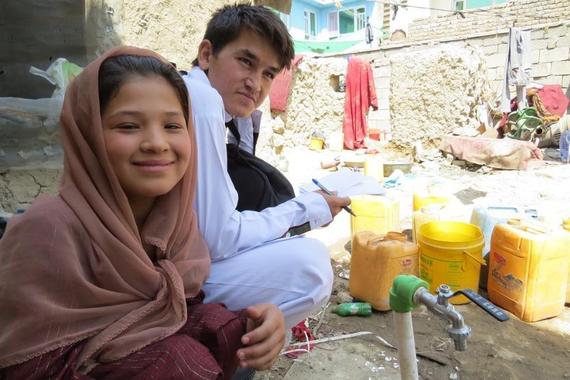September 21, 2015 Kabul
Some days ago, at the Afghan Peace Volunteers' Borderfree Center, I met Jamila, the mother of a little girl, Fatima, who comes to the Street Kids School there. The school is designed to help children working on the streets go to school. An estimated 60,000 Afghan children work in the streets of Kabul to supplement their families' incomes.
Jamila, a young mother of seven, smiles and laughs easily, even though she faces dire circumstances here in Kabul. Nine years ago, at age 19, she fled escalating conflict in the northern province of Baghlan, and moved to Kabul. She had already been married for 12 years.
Kabul was no refuge for her and her children, however. About a year and a half ago, Fatima developed a fever which lasted for about a month. All four of her limbs became paralyzed. In Wazir Akbar Khan hospital, doctors treated Fatima for typhoid meningitis and hospitalized her. After a month, although the doctors said she was not ready for discharge, Jamila had to pull her daughter from the hospital, having incurred huge debt. The doctors made her sign a form saying they were not responsible if Fatima died, and that Fatima must continue to receive twice-a-day injections of strong antibiotics.
Jamila gave her daughter the injections for a year and a half before stopping. But when Fatima developed a fever several months later, Jamila became panicky and put her in another hospital, begging loans from her sister, her uncle and her cousins to pay for the lab tests.
Doctors there told Jamila that Fatima needed injections because typhoid bacteria were in her blood. At this point Jamila faced a debt of 140,000 Afghanis (about $2333 U.S. dollars ). Her only means of income is through washing clothes. The people she washes clothes for say times are hard, and they don't have any income themselves. They have only paid her twice over the past two months, once in the form of some meat and rice.
Then Jamila met Afghan Peace Volunteers carrying out a survey to identify children who could participate in the Street Kids School. When Ali, a volunteer teacher at the Street Kids School, learned about Fatima's illness, he introduced Jamila to Hakim, a medical doctor from Singapore. Appalled by the massive doses of antibiotics prescribed for Fatima, Hakim recommended a stool sample analysis done through the lab of a local hospital. The lab report showed that Fatima no longer needed the antibiotics. Hakim told Fatima that she could become strong and stay healthy by drinking clean water and having a healthy diet, including her favorite dishes of beans and chick peas.
Since 2004, when he first began working in Afghanistan, Hakim has discovered that the country's health care system is riddled by pervasively corrupt practices. Lack of oversight of Afghans' medical system allowed corrupt doctors and pharmacists to over-prescribe antibiotics, and take Jamila's meager income.
But medical debt is not her only health problem - Jamila can't even afford flour for bread to feed her children, let alone nutritious but costly beans. The World Food Programme recently reported an alarming rise in food insecurity, across Afghanistan. The war system there has established tragic patterns of death, of poverty, misinformation, desperate insecurity, and continued despair. If she could flee her circumstances, Jamila surely would seek refuge elsewhere in the world. But she has nowhere else to go. I asked Jamila if she thought her problems were connected to war. "Yes," she said. "War leads to poverty and because of that poverty I have had so many problems. I hope the war will end so that I can find enough food."
The people gathering at the Afghan Peace Volunteers' Borderfree Center recognize the role of war in the multiplicity of suffering of people like Jamila. One of their efforts includes a campaign that they call #Enough! - a simple yet compelling call to abolish wars and instead work to meet human needs. As they put it, "War costs us everything and resolves nothing."
Kathy Kelly (Kathy@vcnv.org) co-coordinates Voices for Creative Nonviolence (vcnv.org). While in Afghanistan, she is a guest of the Afghan Peace Volunteers (ourjourneytosmile.com).

